| Srl | Item |
| 1 |
ID:
144455
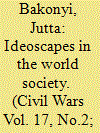

|
|
|
|
|
| Summary/Abstract |
The article uses the example of the Somali war to analyse how globally travelling ideas and political concepts are adapted to local settings and translated into frames that promote collective action and feature violence. It outlines how two ideas with universal claim, nationalism and modernisation were combined with an anti-colonial rhetoric and evolved into the meta-narrative of Somali history. This meta-narrative changed little, and keywords such as (pan-Somali) nationalism, anti-colonialism, development, sovereignty structure most of the discursive repertoires of political actors in Somalia. The main difference is that politicized clan affiliations were during the war dragged out of their shadowy existence and placed in the spot-light of political practice. They alone were however not sufficient to justify claims to power, but were complemented by ‘injustice’, ‘modernisation’ and ‘territorial’ narratives that justified violent deeds as ‘liberation’, ‘defence’ or ‘territorial rights’. Islamists employed similar key narratives and revived the pan-Somali anti-colonialist nationalism, but rooted it in a religious rational. Their ability to abandon culturalised frames contributed to their success.
|
|
|
|
|
|
|
|
|
|
|
|
|
|
|
|
| 2 |
ID:
185638
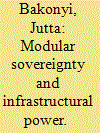

|
|
|
|
|
| Summary/Abstract |
This article uses the example of the Mogadishu International Airport zone and takes a spatio-temporal lens to explore how (sovereign) power unfolds in international interventions that aim at building a sovereign state. I show that the Mogadishu International Airport zone emerges as an elastic frontier zone that contradicts the sovereign imaginary intervenors aim to project and undermines many of the taken-for-granted boundaries that states tend to produce. The Mogadishu International Airport and similar zones emphasize the centrality of logistics and circulation in interventions, but also point towards their temporal and liminal character. Modularity became the material answer to the demand to secure circulation while adapting to the rapid rhythm and short timeframes of statebuilding. Modular designs enable the constant adaptation of the intervention terrain, allow intervenors to deny their power and imprint and facilitate the commercialization of supply chains and intervention materials. Sovereign power that operates through such zones becomes modular itself. It is exercised as an adaptable, in parts exchangeable, and highly mobile form of power that operates through crises and emergencies. The spaces and materials created by modular forms of sovereign power remain elusive, but nonetheless stratify experiences of power and security.
|
|
|
|
|
|
|
|
|
|
|
|
|
|
|
|
| 3 |
ID:
103126
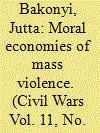

|
|
|
|
|
| Publication |
2009.
|
| Summary/Abstract |
The focus in the article is on the beginning and expansion of the Somali war between 1988 and 1992. Three patterns and dynamics of mass-mobilisation are comparatively examined: the relatively sudden transformation of the northern guerrilla struggle in a civil war 1988, the expansion of the war to the southern region after 1989 and the mass-upheaval in Mogadishu 1990/91. Although clan-affiliation became a prominent tool to mobilising violence and to framing friends and foes throughout Somalia, the patterns of organising clan-relations within the insurgent movements and between the movements and the non-armed population differed and laid the basis for the different trajectories of violence in the Somali regions.
|
|
|
|
|
|
|
|
|
|
|
|
|
|
|
|
| 4 |
ID:
103124
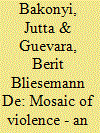

|
|
|
| 5 |
ID:
161363
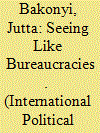

|
|
|
|
|
| Summary/Abstract |
Development promotes bureaucratization, and bureaucracies are based on knowledge and produce knowledge. Failures of development are therefore regularly attributed to a lack of knowledge. The article argues that the quest for knowledge is embedded in the managerial rationality of interventions. This rationality also structures the developmental knowledge field and thereby generates ignorance. The example of a state-building program in Somalia is used to empirically explore how the generation, administration, and transfer of knowledge was intertwined with ignorance. It shows what knowledge missed, obfuscated, ignored, or even hid and how knowledge and ignorance were arranged in the daily state-building practice. This approach sheds light on relations and mechanism of power exerted in development and helps to explain its effects. In Somalia, omission, silence, secrecy, and strategic and bureaucratic ignorance enabled the program to delineate the interventionist terrain as technical and to depoliticize state-building. They also helped to expand liberal modalities of government to “remote” and “unruly” Somali villages.
|
|
|
|
|
|
|
|
|
|
|
|
|
|
|
|